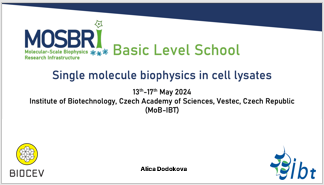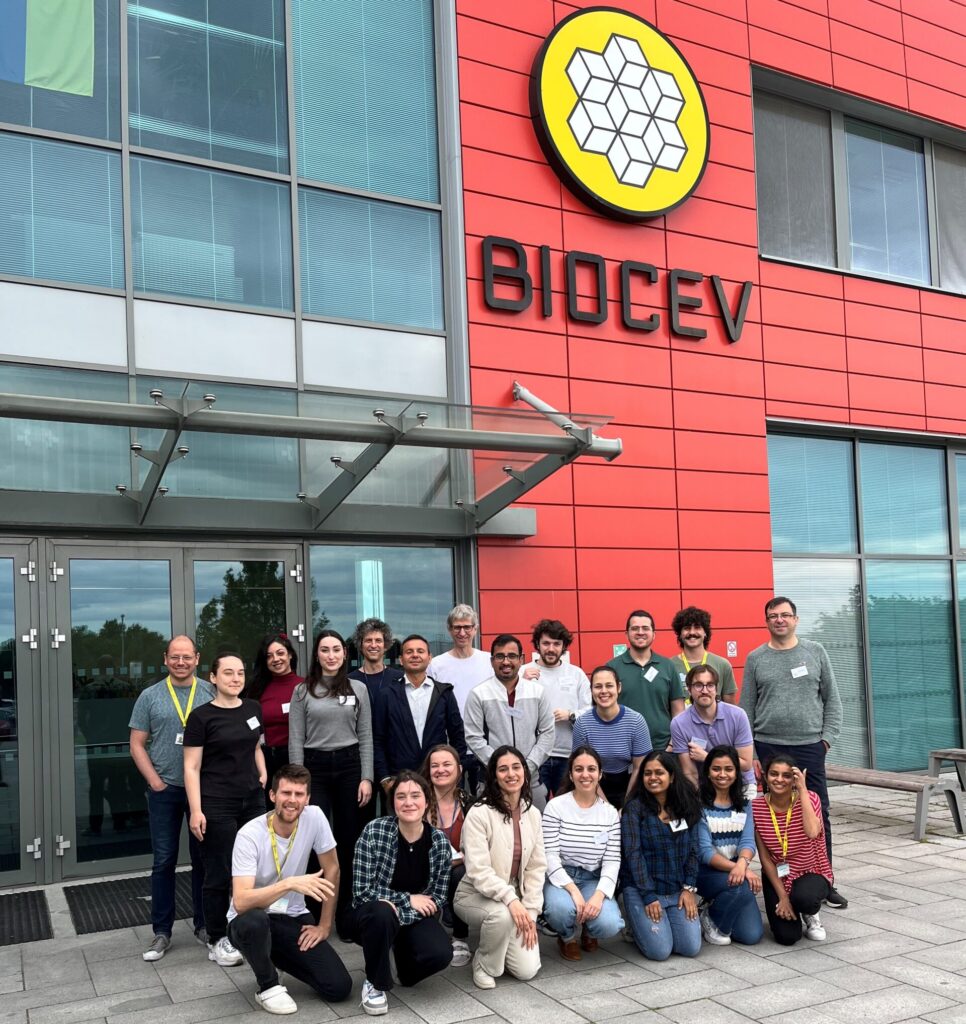BLS2: Single molecule biophysics in cell lysates
Dates: Monday 13th– Friday 17th May 2024
Location: Institute of Biotechnology, Czech Academy of Sciences, Vestec, Czech Republic (MoB-IBT)
Full address: Institute of Biotechnology, Czech Academy of Sciences, Prumyslova 595, 25250 Vestec, Czech Republic
Number of participants: 20
It is no longer possible to apply for this school. The applications received are under review and applicants will be informed once a decision has been made.

Description of the course:
This basic-level school is aimed at biologists, biophysicists, biochemists, structural biologists, etc., who want to learn a technique enabling high throughput screening for dynamic parameters of biochemical interactions on a single molecule level.
Single molecule imaging techniques enable following bio-molecular interactions with unprecedented resolution. Following single molecules in cells is often challenging due to the complex geometry of the intracellular environment. By contrast, in in vitro reconstituted systems, comprising only few bio-molecules of interest, single molecule imaging is achievable e.g. by placing the sample in close vicinity of a glass surface and using Total Internal Reflection Fluorescence (TIRF) microscopy. However, the main obstacle of this method is obtaining functional bio-molecular samples in high enough quantity and purity. During the Basic Level School, we will explore an experimental approach combing the best of the two worlds by imaging bio-molecular interactions with single molecule resolution in cell lysates. This method employs the usage of established in vitro methods, such as TIRF imaging, while not being dependent on laborious sample preparation, and, importantly, enables following single molecule dynamics in the presence of other cellular components.
Hands on training will be provided on TIRF-based single molecule imaging in cell lysates and basic image analysis of the acquired data. As an example, for one experimental system we will explore interactions between microtubules and microtubule-associated proteins, such as molecular motors.
Invited speakers
- Carsten Janke, Institut Curie
- Tim Mitchison, Harvard Medical School
Outline of the course:
The course will start on the morning of Monday 13th May and end on in the afternoon on Friday 17th May and will combine both theoretical and practical content.
The course will start with a short introductory round and theoretical lectures (Monday), will then continue with hands-on microscopy and data analysis sessions (Tuesday – Thursday) and will be finished by presentations of the acquired results (Friday).
Other details:
The course is aimed at trainees with little experience in the domain and/or people wanting to acquire new scientific and technical skills: graduate and PhD students, post-doctoral fellows, early career scientists, technicians, core facility staff. The course will be open to 20 selected participants, who should come from places where such training is not available locally or in close proximity.
The scientific committee will favour the selection of candidates who:
- work or study in institutions without expertise in these types of methodologies and technologies and who
- show that the outcome of the course will be used directly in their projects and activities.
Registration to the course will be free of charge. Twenty travel bursaries of a maximum 200 euros each will be offered to cover travel costs and local accommodation in shared twin hotel rooms will be arranged and paid for by the organisers. Successful applicants will be informed about the eligible expenses when they receive their formal acceptance letter.
Download a pdf version of a poster for this course:
BLS2: Single molecule biophysics in cell lysates, took place in May 2024 in Vestec, Czech Republic.
The Basic Level School “Single molecule biophysics in cell lysates” took place at the Institute of Biotechnology, Czech Academy of Sciences, Vestec in May 2024. The school was attended by 15 participants from 10 different countries, and focused on hands on training on TIRF-based single molecule imaging in cell lysates and basic image analysis of the acquired data. As an example experimental system we explored interactions between microtubules and microtubule-associated proteins, such as molecular motors. Two top experts in the field, Carsten Janke (Institut Curie) and Tim Mitchison (Harvard Medical School) gave talks on their current microtubule-related research, while hands-on sessions were accompanied by the presentation of microscopy techniques.
During the hands-on experiments, single molecule experiments were carried out with samples of motor proteins and microtubule-associated proteins, which were specifically prepared for the course and which haven’t been investigated before. The attendees had plenty of time to learn the microscopy technique, sample preparation technique and simple data analysis and interpretation.
Couse material
Lecture – Single molecule biophysics in cell lysates

Application to take part in the course
The course is limited to 20 participants and therefore any interested parties will need to submit an application for consideration to take part.
Who is eligible to apply:
Anyone with a workplace/host institution in one of the EU member or associated states may apply to attend this course (this includes people from the UK). Applicants from industry are also welcome. It is expected that the applicant has at least a basic knowledge of molecular biology, chemistry and/or biophysics and that it is applicable to their area of research/work. Applications from scientists in the early-stage of their career are particularly encouraged and we will strive to obtain a gender balance of the participants in the course.
How to apply:
The application consists of:
- submission of a completed course application form which includes:
- motivation for attendance
- a short scientific CV
- if you are a student or postdoc, a reference letter.
Once the application period is closed, all submissions will be reviewed and the applicants will be informed of the outcome.
When to apply:
It is no longer possible to apply for this course. The applications received are under review and applicants will be informed once a decision has been made.
Application deadline:
The deadline for submission of an application to participate in this course was: Sunday 31st March 2024.

